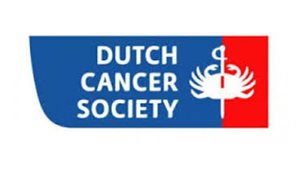26 February 2020
The completeness of tumor removal during surgery is dependent on the surgeon’s ability to differentiate tumor from normal tissue. Ideally, surgeons could use real-time information to detect tumors or positive resection margins during surgery. To accomplish radical excision of tumor tissue, radiotracers can be used that target tumor tissue and can be detected using a gamma probe during surgery. Yet, this technique cannot provide a precise delineation of the tumor and resection margins. The addition of a fluorescent label could help to overcome this limitation. Intraoperative fluorescence imaging could allow accurate real-time tumor delineation, but the penetration depth of emitted light in biological tissue is limited. So, a powerful synergy can be achieved by combining radiotracers for the detection of tumor tissue, and fluorescent tracers for subsequent accurate delineation of tumors.
Mark Rijpkema and colleagues are working on the development of new dual-labeled tracers and currently are implementing this into the clinic. For example, in patients with renal cell carcinoma, intraoperative dual-modality imaging is applied using girentuximab labeled with 111In and IRDye800CW. Similarly, in patients with peritoneal metastases of colorectal cancer we have started a study on radiodetection and fluorescence imaging during surgical resection.
The initial results show that both radionuclide detection and fluorescence imaging provide useful information to improve localization of tumors and radical excision of tumor tissue.

The completeness of tumor removal during surgery is dependent on the surgeon’s ability to differentiate tumor from normal tissue. Ideally, surgeons could use real-time information to detect tumors or positive resection margins during surgery. To accomplish radical excision of tumor tissue, radiotracers can be used that target tumor tissue and can be detected using a gamma probe during surgery. Yet, this technique cannot provide a precise delineation of the tumor and resection margins. The addition of a fluorescent label could help to overcome this limitation. Intraoperative fluorescence imaging could allow accurate real-time tumor delineation, but the penetration depth of emitted light in biological tissue is limited. So, a powerful synergy can be achieved by combining radiotracers for the detection of tumor tissue, and fluorescent tracers for subsequent accurate delineation of tumors.
Mark Rijpkema and colleagues are working on the development of new dual-labeled tracers and currently are implementing this into the clinic. For example, in patients with renal cell carcinoma, intraoperative dual-modality imaging is applied using girentuximab labeled with 111In and IRDye800CW. Similarly, in patients with peritoneal metastases of colorectal cancer we have started a study on radiodetection and fluorescence imaging during surgical resection.
The initial results show that both radionuclide detection and fluorescence imaging provide useful information to improve localization of tumors and radical excision of tumor tissue.
Related news items

RIMLS awards call for nominations
19 October 2021 RIMLS awards several prizes to stimulate and honor our (young) researchers. Upcoming awards are Supervisor of the Year, Best Master Thesis, Best Publication, Best Image and more. Send your nominations now before 24 November 2021. read more

RIMLS online award ceremony proudly presenting the winners
13 January 2021In this special webinar of the RIMLS New Year Celebration, scientific director René Bindels reviewed 2020 and looked forward to 2021. But more importantly a number of researchers received prizes in the traditional RIMLS awards ceremony.
read more
RIMLS PhD retreat registration is open
23 January 2020 Yearly, RIMLS PhD candidates gather for the two-day PhD Retreat. Apart from the science, this event is highly valued for the opportunity to meet and get to know fellow PhD candidates during the social activities. Early bird registration and abstract submission deadline: 4 March 2020. read more
KWF Roadshow 11 November 2019
10 October 2019 In which way(s) can KWF provide optimal support to oncological research and care? How can we maximize impact on our investments? These questions are pivotal in Ambition 2030: the vision that KWF developed in close cooperation with stakeholders in the oncological field. read more
Save the date for Radboud New Frontiers 2018: Betere zorg, netwerkzorg?
17 January 2018 After standard care, standardized care, and personalized care, network care will be care 4.0. But how exactly do you do that? Should we create new structures for it or is it just a matter of trust and ability to step back? read more
